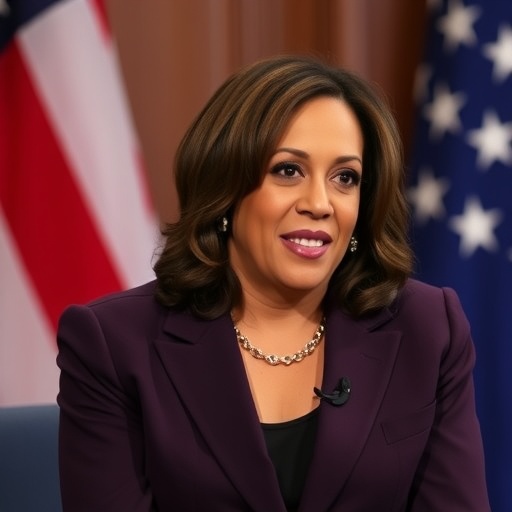Kamala Harris Hints at 2028 Presidential Run in BBC Interview After Stunning 2024 Loss to Donald Trump
In a bombshell revelation that’s sending shockwaves through the world of US politics, former Vice President Kamala Harris has dropped her most explicit hint yet about a potential presidential run in the 2028 election. Just months after her narrow defeat to Donald Trump in the 2024 presidential race, Harris told the BBC in an exclusive interview, “My political career is not done. I’m committed to public service, and there’s more work to be done.” This statement has ignited fervent speculation among Democrats and political analysts, positioning Harris as a frontrunner in what could be a fiercely contested primary for the White House comeback.
The interview, aired on BBC World News, comes at a pivotal moment for the Democratic Party, which is still reeling from the 2024 election results. Harris’s loss to Trump, who secured 312 electoral votes to her 226, was attributed to a mix of economic anxieties, voter turnout issues in key swing states like Pennsylvania and Georgia, and internal party divisions. Yet, rather than retreating from the spotlight, Harris is signaling resilience, drawing parallels to historical figures like Richard Nixon, who bounced back from defeat to win the presidency in 1968.
Throughout her career, Harris has been a trailblazer—from California’s first female Attorney General to the nation’s first female, Black, and South Asian Vice President. Her tenure under President Joe Biden was marked by landmark initiatives on voting rights, climate justice, and reproductive freedoms. But the 2024 campaign trail exposed vulnerabilities, including criticisms over border policy and perceived inconsistencies in messaging. Now, with Trump back in the Oval Office pushing an aggressive agenda on immigration and trade, Harris’s words suggest she’s gearing up for round two.
Harris’s Candid BBC Exchange Fuels 2028 Speculation
The BBC interview, conducted by veteran journalist Emily Maitlis in London, was intended to reflect on Harris’s post-vice presidential life. Instead, it became a launchpad for her future ambitions. When pressed on whether she’d consider another White House bid, Harris didn’t shy away. “I’ve fought for the American people my entire career,” she said, her voice steady and resolute. “Defeat doesn’t define you; it’s what you do next that does. Public service calls to me, and I answer that call.”
Maitlis followed up by asking about the 2028 election landscape, to which Harris replied, “The fight for democracy isn’t over. We need leaders who understand the stakes.” This exchange has been dissected by pundits, with many viewing it as a deliberate tease of her presidential run. Social media erupted immediately after the clip went viral, amassing over 5 million views on X (formerly Twitter) within hours. Hashtags like #Harris2028 and #KamalaComeback trended globally, blending excitement from supporters with skepticism from critics.
Contextually, Harris’s timing is strategic. The Democratic National Committee is already buzzing with early jockeying for 2028, as midterm elections in 2026 loom large. Polls from Quinnipiac and Gallup show Harris leading potential Democratic contenders like Governors Gretchen Whitmer of Michigan and Josh Shapiro of Pennsylvania, with 28% support in a hypothetical primary field. Her approval ratings, which dipped to 38% during the 2024 campaign, have rebounded to 45% post-election, buoyed by her advocacy on issues like abortion rights following the Supreme Court’s Dobbs decision.
Experts note that Harris’s interview aligns with a broader pattern of political reinvention. “She’s channeling the playbook of comeback kids in US politics,” said Democratic strategist James Carville in a CNN appearance. “Think Adlai Stevenson or even Hillary Clinton’s 2016 run after 2008. Harris knows visibility is key.” The BBC piece also touched on her international perspective, with Harris criticizing Trump’s foreign policy as “isolating America from its allies,” a nod to her prosecutorial background where she often emphasized global cooperation.
Reflecting on the 2024 Defeat: Lessons from the Trump Triumph
To understand Harris’s potential 2028 election path, one must revisit the bitter lessons of 2024. Donald Trump‘s victory was nothing short of a political earthquake, flipping not just the presidency but also the Senate and House majorities for Republicans. Trump garnered 51% of the popular vote—his first popular win—capitalizing on inflation fears, cultural wedge issues, and a narrative of Democratic overreach. Harris’s campaign, which raised a record $1.2 billion, faltered in the Rust Belt, losing Wisconsin by a mere 0.7% margin.
Internal post-mortems from the Harris team reveal missteps: a late pivot to economic populism couldn’t counter Trump’s bombastic rallies, which drew 75,000 attendees in Pennsylvania alone. Voter data from the Roper Center indicates that Harris underperformed with working-class Latinos and Black men, groups she had courted vigorously. “We lost the plot on kitchen-table issues,” admitted a senior advisor anonymously to Politico. Yet, Harris herself has framed the loss as a rallying cry. In her concession speech on November 6, 2024, she vowed, “This is not the end of our story.”
Kamala Harris‘s personal narrative adds emotional depth. Born in Oakland to immigrant parents—a Jamaican economist father and Indian scientist mother—she rose through San Francisco’s district attorney’s office, taking on big banks and truancy programs. As Vice President, she cast tie-breaking Senate votes on the Inflation Reduction Act, which invested $370 billion in clean energy. Her 2024 run highlighted these achievements, but Trump’s relentless attacks—labeling her “the border czar”—stuck in the public psyche.
Statistics underscore the uphill battle ahead. Historical data from the American National Election Studies shows that only 20% of defeated major-party nominees successfully return for a second try, with success rates even lower for women. Still, Harris’s fundraising prowess—$800 million in small-dollar donations—positions her well. She’s already planning a national listening tour, starting in battleground states like Arizona and Nevada, to rebuild her coalition.
Democratic Contenders Eyeing the 2028 Prize Amid Harris’s Signal
Harris’s BBC comments have reshuffled the 2028 election deck for Democrats. The party, fractured after Biden’s 2024 withdrawal and Harris’s subsequent nomination, is a patchwork of progressives, moderates, and regional powerhouses. Potential rivals include Transportation Secretary Pete Buttigieg, whose Midwestern appeal could challenge Harris in Iowa; California Governor Gavin Newsom, a coastal liberal with deep pockets; and Senator Cory Booker, who shares Harris’s prosecutorial roots but brings a more charismatic flair.
Early polling aggregates from FiveThirtyEight place Harris at 32% in a crowded primary, ahead of Newsom’s 18% and Buttigieg’s 12%. But the field is fluid. “Kamala Harris has the name recognition, but she needs to address the electability concerns that doomed her in 2024,” notes political scientist Larry Sabato of the University of Virginia. The Democratic National Committee’s rules changes, including ranked-choice voting experiments in some states, could favor Harris’s broad appeal to women and minorities, who made up 54% of her 2024 voters per exit polls.
Party insiders are divided. A recent survey by the Cook Political Report found 62% of Democratic voters open to Harris running again, citing her experience against Donald Trump. However, 28% prefer a fresh face, fearing a repeat of 2024’s turnout slump—Democrats saw 8 million fewer votes than in 2020. Harris’s strategy may involve mending fences with progressives like Senator Bernie Sanders, whose endorsement eluded her last time. She’s scheduled appearances at the 2025 South by Southwest festival and the NAACP convention to amplify her voice on racial justice.
Internationally, the ripple effects are notable. Allies in Europe, wary of Trump’s “America First” redux, see Harris as a stabilizing force. Her BBC interview praised NATO’s resilience, contrasting Trump’s past skepticism. This global angle could bolster her presidential run, especially as climate summits and trade deals dominate the 2028 horizon.
Trump’s Second Term Looms Large Over Harris’s Comeback Plans
No discussion of Kamala Harris‘s ambitions is complete without confronting the elephant in the room: Donald Trump‘s impending second term. Sworn in on January 20, 2025, Trump’s agenda includes mass deportations, tariff hikes on China, and deregulation of fossil fuels—policies that directly counter Harris’s platform. With a GOP trifecta in Congress, Trump could reshape the judiciary further, potentially adding two Supreme Court justices if vacancies arise.
Harris has wasted no time critiquing this vision. In follow-up statements, she warned of “an assault on democracy,” referencing Trump’s 91 felony indictments (many dismissed post-election) and the January 6 Capitol riot. Her prosecutorial instincts shine here; as a former district attorney, she prosecuted over 1,900 cases, including those against transnational gangs. This experience could be a weapon in 2028 debates, framing Trump as a threat to the rule of law.
Yet, challenges abound. Trump’s cult-like following—95% approval among Republicans per Pew Research—means Harris must broaden her base. Economic forecasts predict 3.5% GDP growth under Trump, per the IMF, which could erode her attacks on inequality. Harris’s team is countering with policy white papers on universal childcare and green jobs, aiming to recapture suburban women who swung to Trump by 5 points in 2024.
Legal battles may play a role too. Ongoing lawsuits over election integrity could drag into 2028, with Harris positioning herself as the defender of fair voting—echoing her 2021 Senate speech on the John Lewis Voting Rights Act. Advisors whisper of a “revenge tour” narrative, but Harris insists it’s about service, not settling scores.
Public Reaction and the Road Ahead for US Politics
The fallout from Harris’s interview has galvanized US politics into a preemptive frenzy. Supporters rallied outside her Washington, D.C., home, chanting “Kamala 2028!” while online petitions for her candidacy surpassed 500,000 signatures on Change.org. Critics, including Trump on Truth Social, mocked her as “defeated and desperate,” but this only amplified her visibility.
Looking forward, the implications are profound. A Harris presidential run could redefine Democratic strategy, emphasizing diversity and tenacity in the face of authoritarian leanings from the right. By 2026 midterms, her influence might tip scales in Senate races in Ohio and Montana. If she launches formally—rumored for summer 2027—she’d face a GOP field potentially led by JD Vance or Ron DeSantis, both Trump acolytes.
Ultimately, Harris’s signal isn’t just personal; it’s a beacon for a party seeking redemption. As she embarks on book tours and speaking engagements, her every move will be scrutinized. In the words of historian Doris Kearns Goodwin, “American politics thrives on reinvention.” For Kamala Harris, the chapter after 2024 defeat might just be her most compelling yet, setting the stage for a transformative 2028 election.








